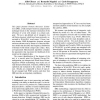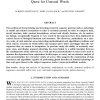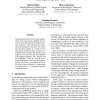2066 search results - page 41 / 414 » Word Maturity: Computational Modeling of Word Knowledge |
EMNLP
2004
15 years 19 days ago
2004
This paper presents Domain Relevance Estimation (DRE), a fully unsupervised text categorization technique based on the statistical estimation of the relevance of a text with respe...
ICASSP
2011
IEEE
14 years 2 months ago
2011
IEEE
In this work we concentrate on generating compound words with high order n-gram information for speech recognition. In most existing compound words generation methods, only bi-gra...
RECOMB
2002
Springer
15 years 11 months ago
2002
Springer
The problem of characterizing and detecting recurrent sequence patterns such as substrings or motifs and related associations or rules is variously pursued in order to compress da...
NIPS
1996
15 years 16 days ago
1996
We have combined an artificial neural network (ANN) character classifier with context-driven search over character segmentation, word segmentation, and word recognition hypotheses...
EMNLP
2010
14 years 9 months ago
2010
This paper proposes a fast and simple unsupervised word segmentation algorithm that utilizes the local predictability of adjacent character sequences, while searching for a leaste...



